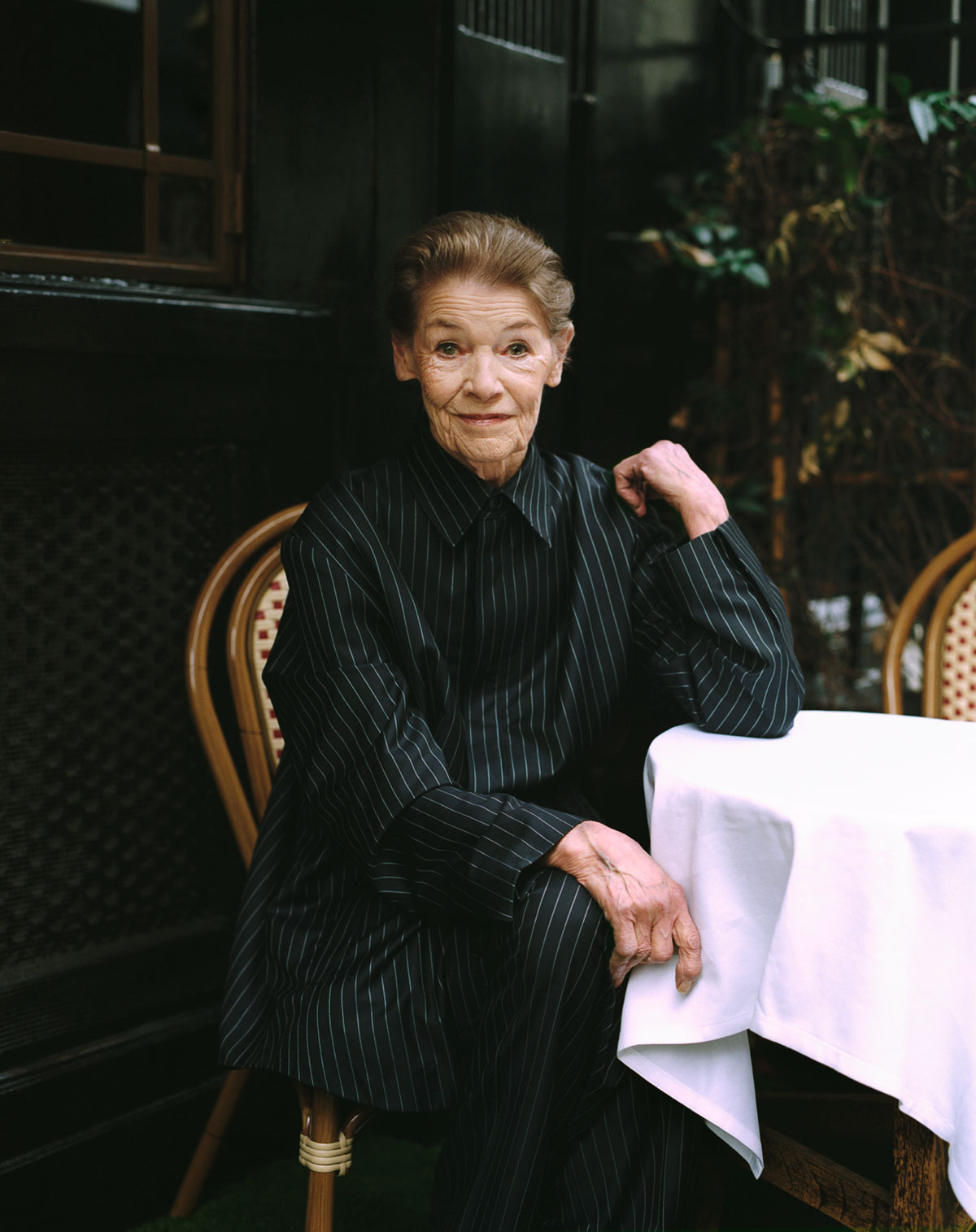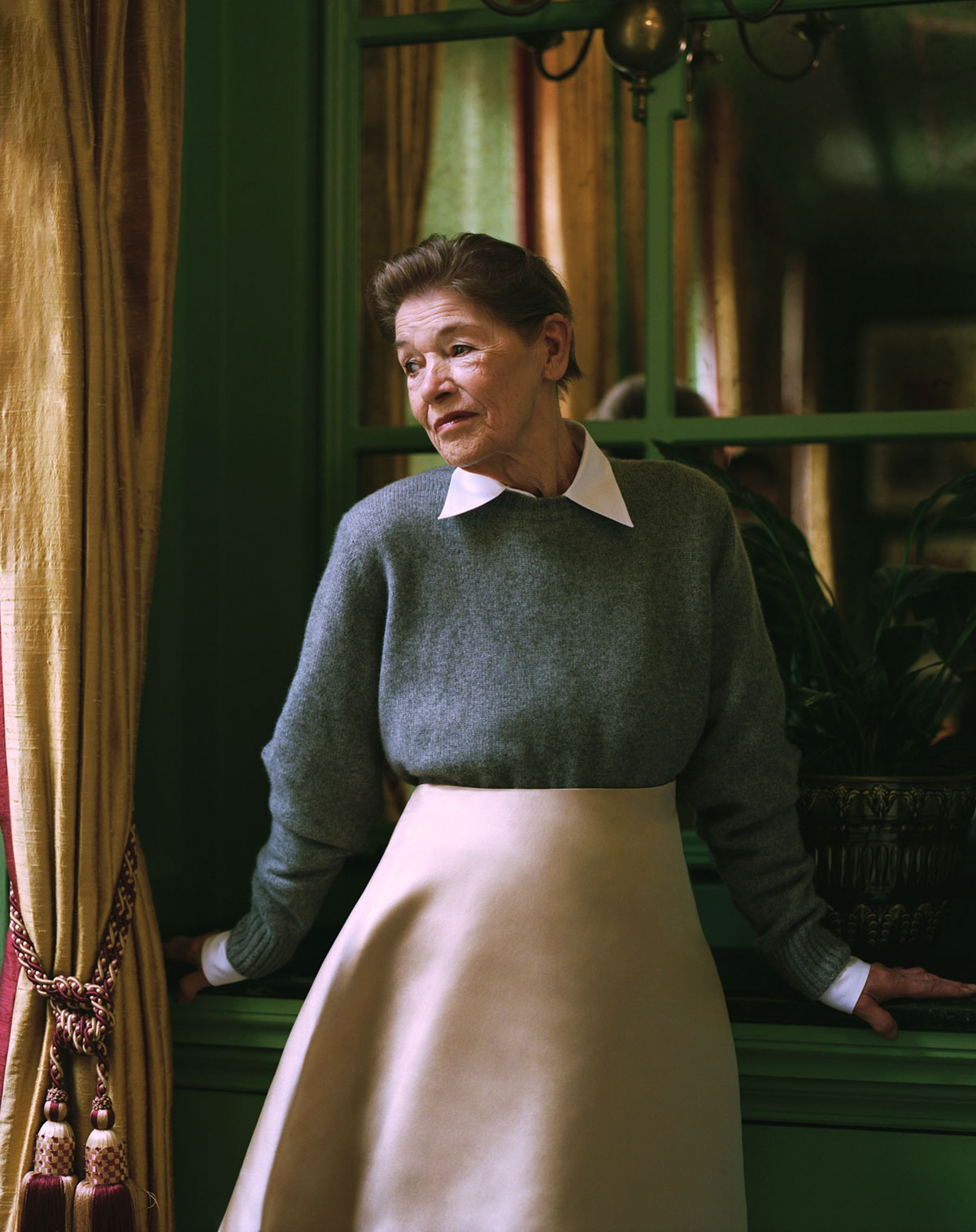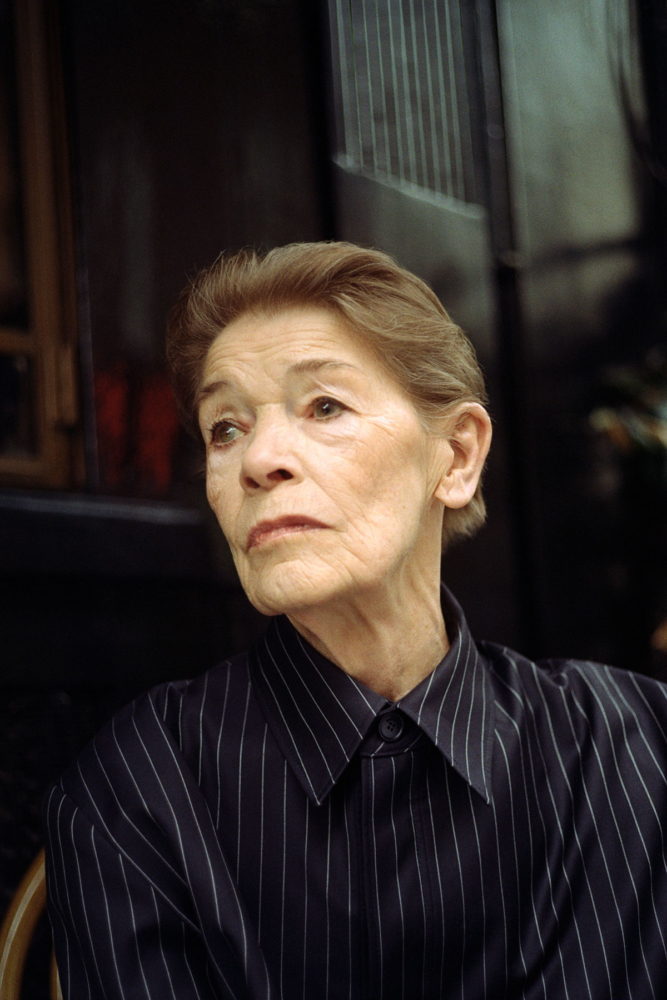Glenda Jackson And Meryl Streep Nearly Tear Everyone Apart

Shirts and Pants by Balenciaga.
It’s the morning after the Golden Globes and Glenda Jackson is sitting next to a crackling fire, a warm drink in her hands, at The Greenwich Hotel in downtown New York. The night before on most Americans’ televisions, a parade of sleepwalking celebrities, disingenuous E! correspondents, and models burdened with trays of Fiji Water trampled the red carpet in borrowed gowns and heavy-seeming jewels. The 82-year-old, steely-eyed Brit across from me is a much-needed salve, a reminder that beneath the pageantry and the preening—and the branding—there is still the craft.
Jackson is in town preparing for the New York leg of her gender-blind performance as King Lear. The production, which opens in April, comes to America from London, where a critic for The Guardian described her as “one of the most powerful Lears I have seen.” It is yet another indelible personal best for Jackson, and a welcome return to Broadway following her Tony Award–winning turn last year as a corrosive widow in Three Tall Women.
For her film work, which includes upwards of 30 projects spanning almost as many years, Jackson has won two Oscars (for Women in Love, in 1971, and A Touch of Class, in 1974). On television, she has been awarded two Emmys (for the BBC series Elizabeth R, in 1972). And yet, perhaps her most satisfying role to date came outside of acting in 1992, when she was elected as a Labour MP, a post she held in her native Britain for more than two decades. In 2011, after years as a thorn in Margaret Thatcher’s side—and, later, Tony Blair’s—she announced that she would be stepping down from politics. “It was,” she has said, “time for someone else to have a go.”
Her retirement, though, was also her renaissance—which brings her back to the stage, and right now back to the lobby of The Greenwich Hotel. “I think Lady Gaga will win the Oscar,” says Jackson, who hasn’t seen the latest version of A Star Is Born, or maybe any of them. I’m about to ask what she’s basing her prediction on, but stop because that’s when Meryl Streep walks in. —NICK HARAMIS
———
MERYL STREEP: I’m so glad we’re meeting. It’s so awful that we’re being recorded, because we could really tear the shit out of everyone. We’ve both been around for a long time.
GLENDA JACKSON: Indeed.
STREEP: You came up in the theater, yes?
JACKSON: My first visit to New York was with the Royal Shakespeare Company in the 1970s.
STREEP: My youngest child—well, she’s not a child, she’s 27 years old—is in her last year of drama school. Things have changed so much. You and I are lucky having come up through theater.
JACKSON: Simply by working with actors who had been actors for as long as they had been, I learned through osmosis. The repertory system is hardly still in full flower, but I would hate to think it’s going to be gone forever. Practically every city in the United Kingdom once had a repertory theater. The quality of them tended to be dictated by how long they ran their shows—weekly, fortnightly—and the work that was available to you was dependent on what drifted down from the West End. But then along came John Osborne, who wrote Look Back in Anger, [a 1956 play that criticized the division in post-war Britain] and the whole of the British theater changed.
STREEP: It really did. With that one play.
JACKSON: When I left drama school, I was told by the head of the school not to expect work much before I was 40, because I was essentially a character actor. And that was true.
STREEP: Me, too. And that was fine. That’s what I aspired to.
JACKSON: It’s what acting is. It’s all character.
STREEP: But not for women.
JACKSON: I just don’t understand this. Despite all the movements, and despite everything we read now, why don’t creative writers find women interesting? It hasn’t changed at all in my direct experience. Women have made huge strides, and yet we’re still seen as being a mere adjunct to whoever is the great dramatic engine of a play.
STREEP: But there seems to be more room in television. It’s been great for women, because it was the poor little sister for so long. People looked at it as a lesser art form, and so women’s stories could go in there.
JACKSON: But there’s still that element of it being a big deal that a woman has written it. We are still regarded as a homogenous group, and when a woman is successful in whatever field, she’s the exception that proves the rule. But if a woman fails, she simply proves that we all fail. That hasn’t changed one iota. I find it bizarre that the problem is not solved by saying, “Oh, well, there are more women writers.”
STREEP: It’s a “woman writer” or a “woman artist.”
JACKSON: Strange, isn’t it?
STREEP: It is quite strange. I have my own theory that for years gay writers, male gay writers, spoke through the voices of women because they weren’t free to write their own stories. And those fabulous creations that were the product of repression actually gave us an opportunity.
JACKSON: You’re probably right. And there is still a lot more to be done.
STREEP: How did you jettison all of your passion as an actor into wanting to change the world in politics?
JACKSON: It was an amazing opportunity to be allowed to do it. But I look at my country now and I wonder what the hell we think we’re doing. One of the big disappointments for me going into Parliament was that quite often it felt like more of a PR exercise than actually getting things done. But it is still such a humbling thing to be a member of Parliament. All MPs hold what we call advice surgeries, where you’d be in a little room and some constituents who you had never seen before in your life would come in and lay their life on the table in front of you. And some of these people’s lives are unbelievable in terms of what they have to deal with. Then, whether you’ve got the result they wanted or you didn’t, they would say, “Thank you.” That puts you in your place.

Sweater, Shirt, and Skirt by Prada.
STREEP: When you were in Parliament, did any of your training come up? In the theater, you have to be able to cooperate with people and read them well.
JACKSON: There were two things. One is that you have to see the world through the characters’ eyes, and you have to see their worth. The other thing is that what people fear most besides death is public speaking, but I had an advantage because I wasn’t afraid to stand up in a room full of strangers. I remember canvassing for the Labour Party before I was in a position of wanting to be a member of Parliament, and people would say, “Well, I like your party, but I don’t like your acting.” Or they’d say, “I like your acting, but I don’t like your party.” The first time I was canvassing to be a member of Parliament, I knocked on a door and this dog was on the other side of it ferociously barking, and I thought, “Oh, God, I’m going to be savaged by a dog.” The door opened, and it was this small man wearing only shorts with a bandanna around his head. I told him who I was and that I hoped he would vote for me on Thursday, and he said to me, “Miss Jackson, I’m to the right of Genghis Khan, but come in and have a cup of tea.”
STREEP: How divine!
JACKSON: I was prepared to do anything I could that was legal to get Margaret Thatcher out.
STREEP: I’ve gone to YouTube to check out various speeches you’ve made in Parliament. You make no attempt to ingratiate, except with your wit, which is so sharp and good. I’m interested in your assessment of your female colleagues who are not more fearless in this way.
JACKSON: It’s probably because I always forget that there are microphones and cameras, so it never occurred to me that anybody other than the people in the chamber would hear what I was saying. But truly, I don’t know why. I think it goes back to this thing that women are regarded as a homogenous group. And when we moved from where we’re first allowed to vote to actually being parts of government, we were automatically presupposed to be ideally suited for all the caring issues. Like what Margaret Thatcher said: Running a country’s economy was just like running a house. Really? They did this recent survey about women in meetings, and it is very unusual for a woman to ask the first question in a meeting. But you don’t lose any femininity by asking a question.
STREEP: Yes, you do. And that’s the secret. But you didn’t care if you scared anybody. I think that is something you might have shared with Margaret Thatcher—she, too, didn’t give a damn who she frightened.
JACKSON: She did in the beginning, but then she began to believe her own publicity.
STREEP: Where does your bravery come from? Your mother? Your father?
JACKSON: I never thought of it as bravery. I come from a working-class background, and one of the things I value most is a strong work ethic, which stemmed directly from the idea that if you didn’t work, you didn’t eat. My parents weren’t particularly political, so I go back to the books I read—Sinclair Lewis and others—where the central themes were the basic unfairness of capitalist society. I was 9 when the Labour government came into power after the war, and then suddenly these things that they promised were being delivered, such as the National Health Service. There was a sense of a society that could be structured to deliver for everybody.
STREEP: Was this recent production of King Lear your first Lear, or had you done Lear before?
JACKSON: A friend of mine had done it in Barcelona, so I went over to see her do it. She was just marvelous, and she said to me, “Why don’t you do it?” And I said, “Don’t be ridiculous. They’d never let me do Lear in England. Are you crazy?” Anyway, cut to the Old Vic wanting me to do something, and, after a lot of discussion, we agreed it would be Lear. Oddly enough, I was intrigued to do it from my experiences as a member of Parliament going to residential nursing homes. One of the things that had become clearer and clearer to me over the years was that the older we get, the more fractured those barriers of gender become. If you look at the other end of the age scale, with babies, we teach them to be boys or girls, they have to be told that. Part and parcel with the process of getting older—and, of course, we are all living longer now—is this period of encountering that fracture of gender, where it’s not shaming for a man to cry, or for a woman to behave like an absolute bastard.
STREEP: Well, I thought it was interesting that you were not playing Lear as a woman. You’re not playing Lear as Queen Lear.
JACKSON: And it’s a fallacy to think it’s an old man’s play. As a character, he has enormous energy.
STREEP: People don’t take this role on in their eighties like you have. They take it on when they’re younger.
JACKSON: But there is so much energy in the play itself. If you can release it, it just carries you along. It’s always blood, sweat, and tears, though, isn’t it? I think we’re all sadomasochists. Why do we go through this agony? Nobody ever even believes us when we say it’s agonizing. But when it works, it’s a unique experience, isn’t it? There’s nothing like the theater. That group of strangers sitting in the dark and that other group of strangers coming off of the light. There’s an energy that goes from one to the other.

Shirt by Balenciaga.
STREEP: It’s a great thing to serve. And you don’t know where you’re going to go. You can get ready. You can learn the lines. But you don’t know where you’re going to go.
JACKSON: When I did Three Tall Women, a stage manager would give me notes after every performance. And I’d say to him, “Why are you giving me notes? I’m not going to do it like that again.”
STREEP: What did doing Lear teach you?
JACKSON: That human nature is immutable. The human condition can be changed. It can be improved. It can be made worse. But human nature doesn’t change. This play is as contemporary as something that was written yesterday because it’s about how we as people are.
STREEP: That leveling of all human beings, from kings to madmen, that’s the gorgeous revelation.
JACKSON: It’s fascinating you say that because I went to China many years ago, and I was taken to the Valley of the Kings, which had been recently discovered by a farmer who had been digging his field and found this incredible burial ground. There were extraordinary marble doors which, once they were closed, you couldn’t open them from the outside. Through these doors, down a corridor that was all carved marble, decorated, fantastic, you then go into the emperor’s room and there’s his coffin, which is vaguely like a boat, but with square as opposed to curved edges. It’s painted red, but there is not one brushstroke of decoration on it. And, I thought, “My God, you come from dust, and this is how you go.”
STREEP: Wow.
JACKSON: Are you engaged in something now?
STREEP: No. I’ve been working like mad for quite a while, so I’m getting ready for my first grandchild. My daughter’s having a baby in February, so I’m going to go out and ruin her life. I specialize in unsolicited advice.
JACKSON: Very good.
STREEP: Do you still smoke cigarettes?
JACKSON: I do, but not to the extent that I did, partly because in my country, as here, you can’t smoke indoors. I can smoke in my own flat if I want to, but my grandson lives above, so I’m trying to cut down. Mind you, I frankly admit I was outside this morning in the bitter cold puffing away. And I did say to myself, “Why are you doing this? This is crazy.”
STREEP: How do you maintain your voice?
JACKSON: Every day I walked down the hill to my local swimming pool, because I was worried I would lose the physical and vocal strength. So I’d walk, then I’d swim. I try to walk every day at least half an hour.
STREEP: Walking is everything.
JACKSON: I can’t see me jogging. I once had to go to the loo in the middle of the night, and my balance had gone completely. It frightened me to death, so now I do exercises, which help with my balance.
STREEP: You stand on one foot, right?
JACKSON: And close my eyes. I can count to 20 before I fall over.
STREEP: That’s really good.
JACKSON: Even though I said earlier it’s not an old man’s part, Lear does say he’s 80.
———
Hair: Jonathan De Francesco at LGA MANAGEMENT
Makeup: Ciara O’Shea at LGA MANAGEMENT
Photography Assistant: Ben Breading
Fashion Assistant: Mei-ling Cooper
Special Thanks: L’Escargot






